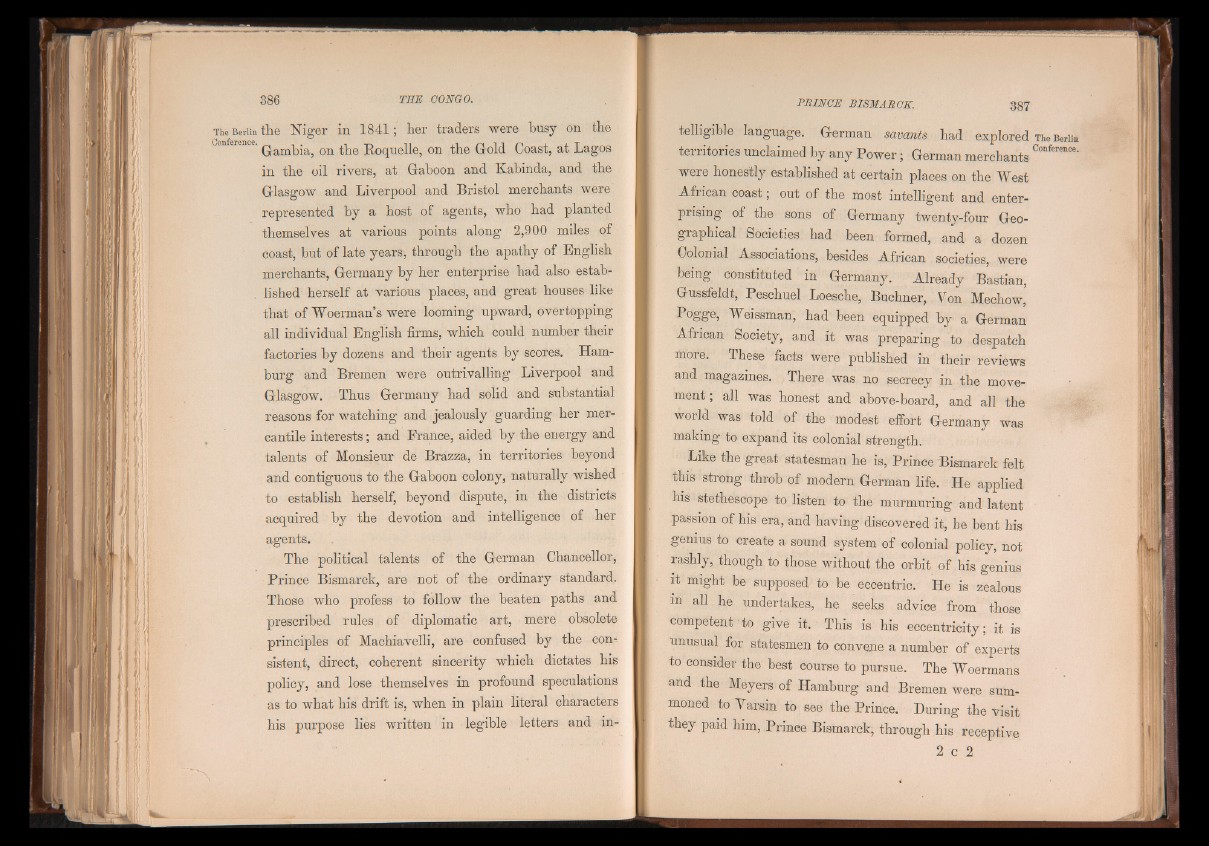
the Niger in 1841; her traders were busy on the
Gambia, on the Boquelle, on the Gold Coast, at Lagos
in the oil rivers, at Gaboon and Kabinda, and the
Glasgow and Liverpool and Bristol merchants were
represented by a host of agents, who had planted
themselves at various points along 2,900 miles of
coast, but of late years, through the apathy of English
merchants, Germany by her enterprise had also established
herself at various places, and great houses like
that of Woerman’s were looming upward, overtopping
all individual English firms, which could number their
factories by dozens and their agents by scores. Hamburg
and Bremen were outrivalling Liverpool and
Glasgow. Thus Germany had solid and substantial
reasons for watching and jealously guarding her mercantile
interests; and France, aided by the energy and
talents of Monsieur de Brazza, in territories beyond
and contiguous to the Gaboon colony, naturally wished
to establish herself, beyond dispute, in the districts
acquired by the devotion and intelligence of her
agents.
The political talents of the German Chancellor,
Prince Bismarck, are not of the ordinary standard.
Those who profess to follow the beaten paths and
prescribed rules of diplomatic art, mere obsolete
principles of Machiavelli, are confused by the consistent,
direct, coherent sincerity which dictates his
policy, and lose themselves in profound speculations
as to what his drift is, when in plain literal characters
his purpose lies written in legible letters and intelligible
language. German savants had explored The Berlin
territories unclaimed by any Power; German merchants Conferenoe-
were honestly established at certain places on the West
African coast; out of the most intelligent and enterprising
of the sons of Germany twenty-four Geographical
Societies had been formed, and a dozen
Colonial Associations, besides African societies, were
being constituted in Germany. Already Bastian,
Gussfeldt, Peschuel Loesche, Buchner, Von Mechow,
Pogge, Weissman, had been equipped by a German
African Society, and it was preparing to despatch
more. These facts were published in their reviews
and magazines. There was no secrecy in the movement
; all was honest and above-board, and all the
world was told of the modest effort Germany was
making to expand its colonial strength.
Like the great statesman he is, Prince Bismarck felt
this strong throb of modern German life. He applied
his stethescope to listen to the murmuring and latent
passion of his era, and having discovered it, be bent his
genius to create a sound system of colonial policy, not
rashly, though to those without the orbit of his genius
it might be supposed to be eccentric. He is zealous
in all he undertakes, he seeks advice from those
competent-to give it. This is his eccentricity; it is
unusual for statesmen to convene a number of experts
to consider the best course to pursue. The Woermans
and the Meyers of Hamburg and Bremen were summoned
to Varsin to see the Prince. During the visit
they paid him, Prinee Bismarck, through his receptive
2 c 2